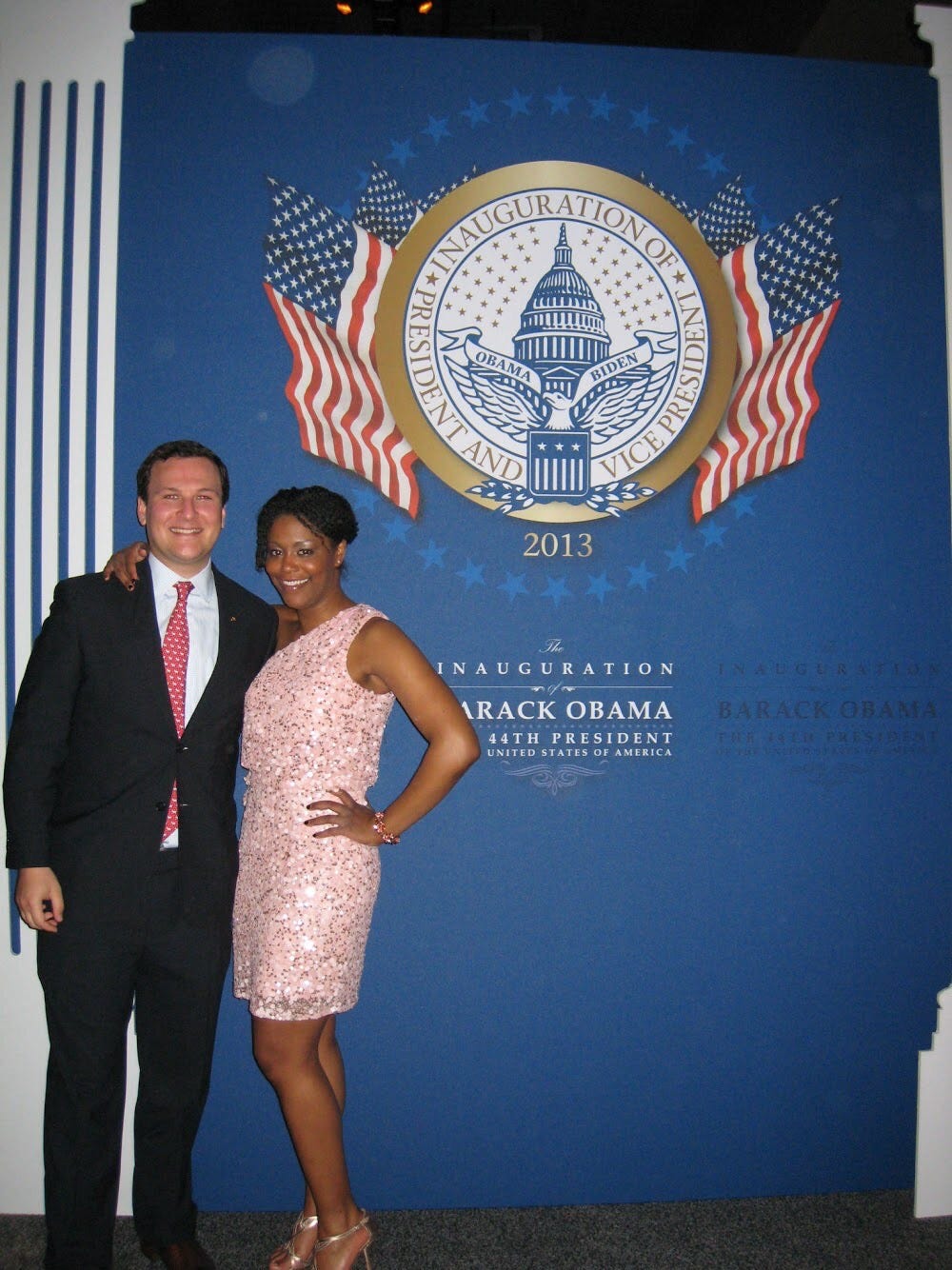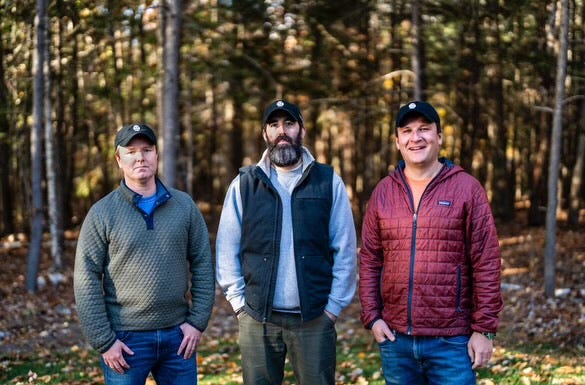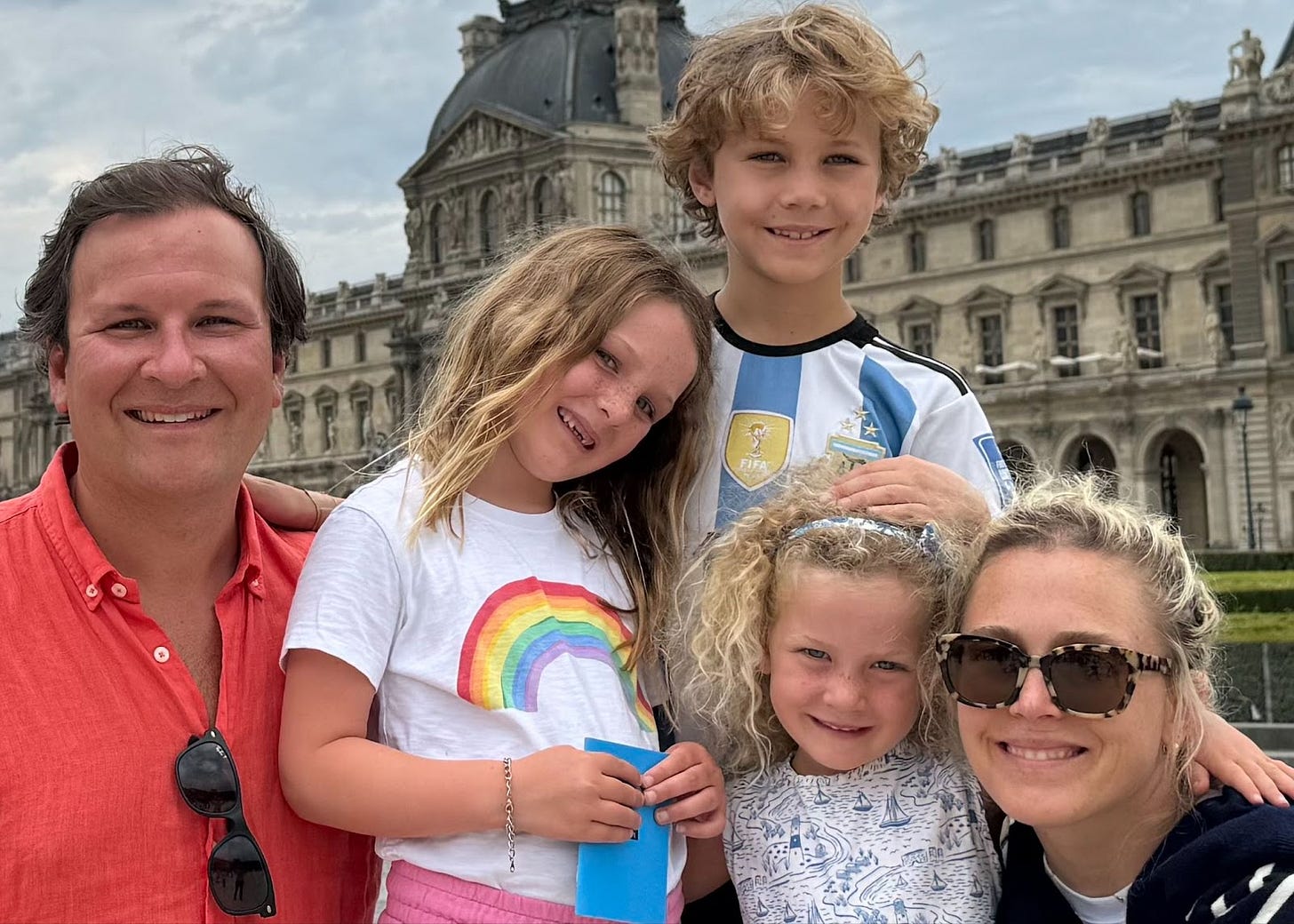My Friends-
Happy Father’s Day to all you dads out there! I don’t talk about my dad much, probably because unlike my mom, he is still here and lives right up the road. But I am so thankful for his presence in my life and Bennett’s too! We are very lucky to have him and I hope those who are fortunate to have living fathers are able to celebrate with them today! And to those without their fathers today, I see you.
I’ve known for a while exactly what I want to share with you all today. This is me and my friend Jay. We worked together for President Obama, crisscrossing the country visiting small businesses and connecting them to resources to grow. We had a blast eating and drinking our way across America, and Jay had a blast constantly taking pictures of me with my mouth full of food, looking like a chipmunk.
On January 31st, 2017, I received a text message from him informing me that he and his wife lost their daughter Bella. She was stillborn. My heart instantly shattered for my dear friend, his wife Elly, and their son Jack. Jay has an enormous heart and so much love to give, so I wasn’t at all surprised when a few years later he started an organization to support grieving fathers and told everyone about his family’s loss without shame. He knew that grief isn’t meant to be hidden away or managed in silence behind closed doors. So today, in honor of all the dads out there for whom Father’s Day is complicated, I’ve asked Jay to share his story. I hope it inspires all of you, and for the men, I hope it pushes you to think differently about how you manage your hurt.
With love and hope,
Marisa
“You’re Good. Hustle to First!”
I wasn’t a particularly good baseball player growing up. Yet, here I am coaching my 10-year-old son’s Little League team. Earlier this week, one of our players, let’s call him Billy, took a hard fastball off his hip. You could hear the thud from the dugout. Billy dropped to a knee, clutching his side, trying to blink back tears. I ran out to check on him, give him an ice pack, and offer to put in a pinch runner so he could rest on the bench. Then, from the bleachers, his dad shouted, “You’re good. Hustle to first!”
I’m sure the dad didn’t mean any harm. Maybe he was just trying to encourage Billy to be brave. Maybe that’s how his own father spoke to him. But as I watched Billy limp down the baseline, my heart broke a little.
Because I know what it’s like to be told to hustle through pain.
Because I know that many boys are raised to choke back the tears and swallow the pain.
Because I know that some wounds don’t show up in X-rays.
***
Eight and a half years ago, on January 31, 2017, my oldest daughter, Bella, was stillborn at 41 weeks. An amniotic band wrapped around the umbilical cord and, seven minutes later, she was gone. My wife Elly and I were—and remain—devastated by her passing.
When we returned home from the hospital without Bella, we were greeted by our smiling, fun-loving son, Jack, who had celebrated his second birthday a week earlier. The juxtaposition between the deep, unrelenting grief streaming through our bodies and the pure joy of reuniting with our sweet little boy was jarring.
For a few months leading up to the baby’s due date, we’d talked to Jack about Mama’s belly getting bigger, read him The Berenstain Bears’ “New Baby,” and explained that he was going to be a big brother. He mirrored our excitement, but he was probably too young to understand what it all really meant. And so, when we walked into the apartment without a baby in our arms, he was certainly too young to understand that his sister had died. He was too young to understand why Mama and Dada now insisted on sleeping on the floor of his room and why Mama and Dada would cry uncontrollably, despite their best efforts to shield him from their pain.
We were all asking, What happened to all the joy, excitement, and light?
Our sun-filled apartment in Portland, Maine now always seemed dark. We were trapped in our third-floor walkup while Elly recovered from an unplanned c-section. The strongest, most determined person I know, she did so in record time through pure will power.
Once Elly was physically up to it, we started walking the hilly streets of our neighborhood daily, no matter how cold and snowy it was. On our first outing, Roberta, the 88-year-old unofficial mayor of the block, made a point to call to us as we headed down Montreal Street with only Jack in tow. For the prior 9 months, she’d watched us on our regular walks and observed Elly’s growing belly. “Any day now…”, she often encouraged Elly. So, when she saw us crossing the street without our newborn, she called out from her front door to check in on us.
“How’s everyone doing…where’s the baby?”
I slowly approached the stoop to delicately explain the impossible while trying to protect Elly and Jack from the agonizing conversation. “She died,” I said. “She was stillborn.”
Roberta stared off past me toward Elly and Jack and then down the street at Casco Bay, a tear in her left eye. “My husband and I lost one of our children too,” she eventually said, almost in a whisper. “She passed away shortly after birth. My husband didn't talk about it once. Not even before he died. Never spoke of her again.” She said it like a simple fact. As if silence was the best way for her husband to navigate grief. As if burying those feelings along with their daughter was the only way for him to survive.
That encounter has stayed with me. I wish I had known Roberta’s husband. I wish he had someone he felt comfortable talking with about their daughter.
Over the years, I’ve experienced this countless times with grieving fathers. Dads trying to hold it together for their families, trying to spare their spouses and living children from any more heartache. Silently “working through the unimaginable,” to paraphrase the song, It’s Quiet Uptown from Hamilton. Silently inheriting grief like a family heirloom. It’s part of why Rob, Chris, and I started Sad Dads Club (SDC), a nonprofit supporting fellow bereaved fathers around the world. Rather than walk a lonely road, we carry each other through the darkest parts of this lifelong journey.
When we first put ourselves out there people were genuinely surprised: a group of men doing something for their mental health? Grieving, together? Out loud? It was still a novel idea. In an increasingly polarized world, it seems male grief somehow transcends cultures. Grief, especially paternal grief, is still seen as something to be managed privately. Almost universally, men are taught to be strong, stoic, and silent about grief. To move on. That crying, talking about loss, and being vulnerable are signs of weakness. And yet, the silence has never healed anyone.
In a recent piece by Alexandra Moe for Harvard Public Health Magazine, Katherine Shear, the founding director of the Center for Prolonged Grief at the Columbia University School of Social Work, notes, “People sort of forget about the fathers.” I’d go a step further: people don’t only forget, they want dads to be OK. They just want us to hustle to first.
I get it. We don’t all have the vocabulary for discussing loss. Not even our closest friends know exactly how to talk with us about our deceased children. There isn’t a playbook for showing up (well, at least there didn’t used to be. Check out Marisa’s Grief is Love!). For many new Sad Dads Club members, we’re the first people they’ve ever spoken to about the child they lost, whether their child died four days ago or forty years ago. It takes a dedicated safe space and sometimes a stranger on the internet saying, “me too,” for men to open up.
Grief is not linear, and the loss of a child is not something you ever get over. It’s complex and, in my experience, not something you can hustle through.
Father’s Day is complicated for a lot of people—for those who’ve lost fathers, for those estranged from theirs, and for those who are fathers but whose children aren’t here to make them a card or breakfast in bed. There are dads out there who are quietly breaking on Father’s Day. Not because they are ungrateful, but because someone is missing. Because they aren’t sure how to talk about it. Because they haven’t found their club yet.
That’s why Sad Dads Club exists. Our mission is simple: we help fellow bereaved fathers navigate life after loss by nurturing a supportive community and providing access to quality professional mental health services.
This year, we partnered with Names for Good to create special SDC bracelets with dads’ child’s name as a simple reminder that they are not alone. Names for Good is generously donating a portion of the proceeds from every SDC bracelet to our 501(c)(3) nonprofit. That money goes directly to helping us fund therapy sessions for grieving dads, offer community support groups, and build out our in-person retreat programming.
A fellow Sad Dad recently told me this is the first Father’s Day that he feels like a dad and like he’s allowed to talk about missing his son. That’s all we’re trying to do, give men permission.
Permission to hurt.
Permission to remember.
Permission to still be fathers, even when their child isn’t here to say, “Happy Father’s Day.”
***
Back on the baseball field, after Billy reached first base, Jack ran over from the bench, asked him if he was ok, and gave him a quick fist bump. It was a small gesture, but I saw the way Billy straightened up a little. That’s all it takes sometimes. Someone to say, “That must’ve hurt. I know what you’re going through and I’m here for you.”
So if you’re a grieving dad reading this, or someone who loves one, please know that you don’t have to hustle through the pain. You can speak it out loud. It’s OK to talk about how much this hurts. We’re listening and we’re here for you. Happy Father’s Day.








What beautiful words. Thank you for sharing.